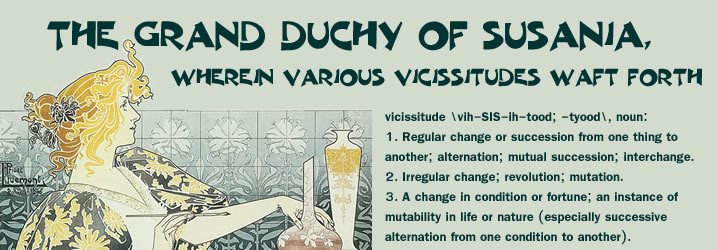And it's always interesting, or funny, or apt. One minute he's telling a
story about his adored 2 year-old daughter (known to regular readers as
Gnat), and the next he's analyzing certain ridiculous aspects of the
war on terrorism, and the next he's talking about the latest Star Wars
movie. The most wonderful jumble of well-reasoned, well-informed thought
on serious matters combined with mundane (but enjoyable) personal
revelations on family life.
And he is so well-informed. At one point he referred to some local
politicians as "Panglossian" which sounded familiar but I couldn't place
the reference. Then Google reminded me - Dr. Pangloss in Candide. Now
THAT'S a literary allusion. And he tucks them in like truffles
throughout - the most delightful little nuggets of intelligent analogy
and classical reference. I literally sit there and bounce up and down in
my chair sometimes, I'm just so tickled to see a reference to a
historical character or event that I haven't heard since college and my
more literary days.
I forgot what it was like to have that sort of context to life - to
reference arcane aspects of the French Revolution, or Greek and Roman
Mythology, or the 18th C. novel. I miss it a lot. I know it sounds
conceited to say that, and I wish it didn't. It's like taking delight in
something that you do pretty well, like golf or crossword puzzles. In
my line of work a classical allusion is as likely as... as Tantalus
getting a drink of water. That's why they are so delightful when they do
appear.
I honestly thought I would stay in academia. I read so much, just tons
of books growing up, sometimes 1-2 a day. I never enjoyed studying, and
was in fact appallingly bad at math, but I did like cultural history and
good stories, and I wrote decent papers. I think I knew that I wasn't
going on to a higher degree when a history prof told us one day about
grad school and the "Book of the Day" club we would be joining if we
continued on in history. The stuff I was reading at this point, though
chock-full of goodness and exhaustive scholarly fact, was excessively
dull and did nothing to endear me to history from the academic sense.
I did discover soon after the crucial difference between what I liked
in history, and what was taught in classes - what I call "cultural"
history. What people ate, read, wore, and did. Academia only rarely
strayed into those areas, and when it did it was always with a rather
surprised sense that this was rather enjoyable, wasn't it? I had read
too much historical fiction growing up - I was used to learning
historical facts embedded in a narrative.
But I have completely strayed away from the point I wanted to make when
I started, which is this: I have no gift for puns. I wanted to set a
foundation of how I consider myself to be a semi-intellectual, good at
Trivial Pursuit and knowledgeable of obscure vocabulary words... but
that I can't make a pun to save my life.
It's like I have pun dyslexia - I rarely recognize them when they
appear, and I most certainly could never come up with them on my own. I
have managed to squeeze out 1 or 2 with a very great effort, like a
small child laboriously writing his name for the very first time and
proudly displaying see what I did? In the improv comedy group I belong
to now, there are people who can reel them off like a factory conveyor
belt, and I just stand there, as confused as if they were speaking to me
in Chinese. The only time I truly feel at a loss in conversation is
when pun-swapping is taking place. The chunk of the brain that handles
the pun-making process is dead, and has been as long as I've been
conscious.
I think it is God's way of keeping me humble. If I am thinking that I
am particularly clever, then a pun comes along, and when I realize it (a
good 60 seconds later, when everyone has already moved on) the sense of
self-disgust and "oh how very stupid I am" is quite enervating.


No comments:
Post a Comment